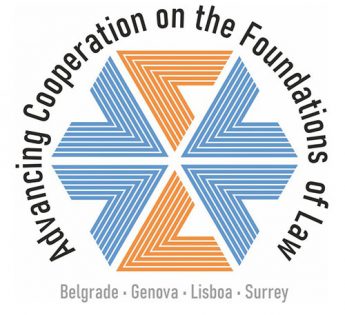
The Call for papers for the book “Feminist Legal and Political Practices – The Contemporary Interplay of Gender, Intersectionality and Diversity”
The Call for papers for the book
Fabio Macioce, Dragica Vujadinović, Zara Saeidzadeh (Eds.)
Feminist Legal and Political Practices – The Contemporary Interplay of Gender, Intersectionality and Diversity
In the series Dragica Vujadinovic, Ivana Krstic (Eds.) GENDER PERSPECTIVES IN LAW, Springer
Dear colleagues!
We think it is time for a book on FEMINIST LEGAL AND POLITICAL PRACTICES, to be published in the series Gender Perspectives in Law, Springer.
The series Gender Perspectives in Law is the first systematic attempt to offer gender-competent legal knowledge in all fields of law and politics, including practices like judging, policy-making, feminist movements and their legal and political initiatives, etc. The necessity of a gender-sensitive approach in legal education emerges from the values and normative standards of today´s international and national law. Educating law students (who will eventually become future lawyers, judges, prosecutors, civil servants, members of governments and parliaments), as well as students of the humanities and the social sciences, in a gender-sensitive and gender competent manner means investing in a legal and political future of better quality. It will inform more adequate interpretation and implementation of legal frameworks, and better-designed public policies. It also means investing in a more just legal system by sensitizing judges and other legal professionals in all fields of legal practice, including public administration and policy-making. Gender competence in law fulfills the ideal of contemporary notions of justice – equal respect and protection for all individuals, to create equal opportunities and diminishes gender-based discrimination.
This book series aims to stimulate the authors as well as other experts and academics from the fields of law, the humanities and social sciences, to re-construct their legal and multidisciplinary knowledge based on the cross-cutting notions of gender equality, intersectionality and diversity.
Four books have already been published in 2022/2023:
- Book I – Dragica Vujadinović, Antonio Alvarez de Cuvillo, Susanne Strand (eds.) Feminist Approaches to Law – Theoretical and Historical Insights.
- Book II – Marko Davinić and Svetislav Kostić (eds.) Gender-Competent Public Law and Policies.
- Book III – Ivana Krstić, Marco Evola, Maria Isabel Ribes Moreno (eds.), Legal Issues of International Law from a Gender Perspective.
- Book IV – Gabriele Carapezza Figlia, Ljubinka Kovačević, Eleonor Kristoffersson (eds.), Gender Perspectives in Private Law.
We would like to take this opportunity to cordially invite you to submit your work for the publication Feminist Legal and Political Practices – The Contemporary Interplay of Gender, Intersectionality and Diversity. Different perspectives and methodological approaches are welcome, ranging from empirical legal and political studies to doctrinal contributions, national or thematic case studies, historical and comparative assessments, domestic as well as international perspectives, conceptual as well as practical considerations.
Contributions may cover, among the many, the following issues:
- Historical aspects of women’s political activism and practices (What aspects have been particularly relevant in the construction of women’s political action? What of the feminist movements of the past is relevant for contemporary political struggles? What characteristics did political feminism have? What are the characteristics of contemporary political feminism?).
- Studies on contemporary legal manifestations of gender oppression, and on contemporary political, economic, cultural, social, religious systems of oppression and privilege, as well as on emancipatory tendencies in contemporary law, politics, culture etc.
- Analyses of how women’s voices are excluded, silenced and marginalized in the labor market, judicial system, state bureaucracy, nonprofit organizations, and national debates on citizenship.
- Analyses of specific transformations in social, economic and political systems, and of how these changes are able to shape women’s social, economic and political ability to make their voices heard.
- Studies on contemporary women’s political practices that challenge social norms and behaviors that continue to limit women’s agency within the public and social spheres (What actions significantly shift the balance of local norms to create new spaces for the expression of women’s agency? What actions affect norms related to the age of marriage, or legal recourse on oppressive dowry practices or the promotion of women’s eligibility for political office?).
- Studies on political and legal activism related to reproduction, sexuality, bodily integrity and freedom; analyses on reproductive justice as an example of critical feminism and intersectionality, as well as a place where activism and academia meet, organizations and people act, and political claims arise.
- Discussions on the role played by ideals and political/legal concepts of independence, control, choice, autonomy, rationality, and free action, within the articulation of feminist political practices.
- Analyses of the interplay between feminist movements and anti-capitalist, post-colonialist claims, within the critics of contemporary violence and dispossession of marginalised peoples. Second wave Western feminist movements and Critical Race Feminism, Global Critical Race Feminism (exploring the conflicts between customs and western costitutional norms and the tensions between communitarianism and individualism). Interplay of critical race feminism, international law, global feminism and postcolonial feminist theory and practice.
- Analyses on women’s political agency, explaining how it can be understood and implemented from an intersectional perspective. Analyses of the interplay between women’s agency and LGBTQI+ movements and claims, exploring similarities and differences, goals and strategies; analyses of contemporary women’s struggles to liberate sexuality from traditional forms, as well as from the restrictions related to gender, class, race, and consumerism. Discussions of the interplay between women’s and LGBTQI+ movements concerning sexuality, family rules, care labor, etc.
- Philosophical aspects of the concept of group agency, when it relates to women (can women be understood as a group? In what sense and with what limits? How the actual power of social constraints can be balanced with the capacity to act situatedly against them? What is the relationship between the individual and the social, and how individual agency can be theorized within this context?).
Your paper needs to have an abstract (no more than 300 words), keywords (3 to 5), and not more than 35.000 characters of text (without spaces, approximately 16 pages, plus footnotes and a reference list). Your contribution is expected to match strict criteria of the highest academic quality, based on two peer reviews. It should be original unpublished work and not under consideration for publication elsewhere, either in hard copy or online.
On a cover page, please state your full name, affiliation, and location, as well as a CV (50 to 100 words).
The title and abstract shall be submitted until April 30, 2024.
The selection of abstracts will be announced until May 31, 2024.
The draft text shall be submitted until September 31, 2024.
Reviews will be conducted until December 15, 2024.
The book is scheduled for release in March 2025.
Please send your abstract (up to 300 words with keywords) to the following emails: Ana Zdravkovic – Assistant editor, ana.zdravkovic@ius.bg.ac.rs , and co-editors fmacioce@lumsa.it, dragicav@ius.bg.ac.rs, Zara.Saeidzadeh@oru.se
Please refer the email as: Abstract/Article for Feminist Legal and Political Challenges
– The Contemporary Interplay of Gender, Intersectionality and Diversity
The following Springer Writing Guidelines apply
Main technical rules:
Use Times New Roman 12, space 1,5 for the main text
Use Times New Roman 10, space 1 for the footnotes
The main title of the text – Times New Roman, normal letters, big first letters, Bold, Font 14
Abstract – Times New Roman 12, space 1, bold Abstract
Keywords: Times New Roman 12, space 1, italic Keywords
Subtitles, numeration 1. …, 2…. , Times New Roman 12 , bold 1. Introduction, 2. Anti-Discrimination Law
Sub-subtitles, Times New Roman 12, bold 2.1 Anti-Discrimination Law Based on Gender
2.1.1 Discrimination against women
2.1.1.1 Discrimination
Outline:
Please use decimal numbering headings throughout the whole book. All chapters should start with heading 1., followed by 1.1, 1.2, 2. etc. Please make sure that no heading level is skipped or used twice. Please do not refer to page numbers within the volume as the page numbering will alter during typesetting and proof corrections.
Chapter opening page:
For the first page of each chapter, we need the following information about the authors: Name, Institution (if applicable), Department (if applicable), City, Country, Email address.
Please write the contributors’ information in the manuscript directly beneath the chapter title. The contributors’ information will be published on the first page of the chapter. The contributors’ academic titles or roles cannot be included on the chapter’s first page. However, we can include short contributors’ biographies at the end of the chapter.
Please use footnotes and not endnotes
The reference list is included in the end of the paper
References and footnotes
For footnotes, use the following rule author: Miller (1980), two authors: Miller and Smith (1999), three or more authors: Miller et. al. (1996)
In the Reference list, please include the list in alphabetical order.
Concerning the Reference style, please use the Humanities style.
Example:
Cameron, Deborah. 1985. Feminism and Linguistic Theory. New York: St. Martin` s Press. — In the footnote: Cameron (1985)
Cameron, Deborah. 1997. Theoretical debates…. In Gender and Discourse, ed. Ruth Wodak, 99-119. London: Sage: Publications. — In the footnote: Cameron (1997), 99-119.
Figures/tables:
Please number the figures and table chapter-wise. (In case the contributors use figures or/and tables). The first figure in each chapter should be “figure 1”, and the first table in each chapter “table 1”. Please refer to each figure/table in the text, e.g., “see table 2”, “as figure 1 shows” … As the figures’/tables’ position might shift slightly during typesetting, the references to the figures/tables are important. In the online version, we will link from the references to the respective figure/table. Each figure must have a legend, and each table a caption. Please indicate the source of each figure or table.
If the figures/tables are not created by the contributors themselves, especially for this volume, or have been published before, we need the copyright holders’ permission to reuse those figures/tables in the online and print versions.
Other instructions on manuscript preparation are available at: https://www.springer.com/gp/authors-editors/book-authors-editors/your-publication-journey/manuscript-preparation.
Please, be aware that we cannot forward papers that do not conform to the technical rules.




